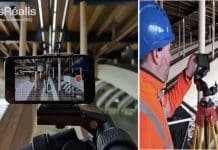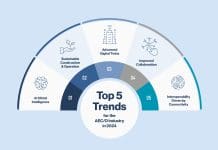Helen Rogers, housing product director at global software providers Civica, looks at the potential of digital twins to deliver a better, safer, greener social housing sector across the UK
Every sector knows the importance of digital transformation. From aerospace to construction, automated processes and digitally enabled collaboration have quickly gone from being a “nice to have” to a “cannot do without”. While the digital journey has been underway for many years now, the pandemic has, for each of us, put it into much sharper focus.
For the wider construction sector, digital twins – virtual representations of physical spaces – have been recognised as a key part of that digital journey for some time.
But what about our social housing sector, which provides more than four million homes across the UK?
Towards the end of last year, Civica brought together experts from leading social housing providers and technology firms to examine the potential of digital twins to deliver better outcomes for both providers and residents in our social housing sector. While it was agreed by all that getting started is a major challenge, digital twins nevertheless have huge potential to make homes safer and greener, deliver savings and improve the overall resident experience.
Setting the standard
Digital twins depend above all else upon high quality, reliable data. Housing providers have endless possible data points that need to feed into a digital twin. But this data is all too frequently held in legacy systems ranging from hard drives to ring binders, with no defined standards. Unless data is collected and managed effectively, it is of little practical use. This is as true for housing as it is for any other sector.
If you want to see what good data management looks like, look no further than leading manufacturing sectors such as aerospace and defence. The social housing sector is unfortunately not yet anywhere near this level of standardisation. While some attempts have been made (by HACT, for example), legislation has a vital role to play in building a consistent set of standards for the sector.
Better, safer, greener homes
So, what tangible benefits could digital twins deliver for our social housing sector? On a strategic level, digital twins will help providers such as councils or housing associations meet and exceed new standards and rules set down in legislation. Compliance can be expensive but an accurate digital twin will give detailed insights into where attention is needed.
On a more practical level, digital twins also have the potential to help reduce bills and improve environmental outcomes. Real-time data could allow residents to understand the effect a few degrees on the thermostat would have on their heating bills, carbon footprint and on the comfort of other residents in the building. “Nudge theory” has the potential to drive strong behavioural changes in residents thanks to the information available through digital twins.
Beginning the journey
So how should housing providers begin their journey towards using digital twins? One of our roundtable participants explained how they had started trials gathering data with a 3D camera. While not perhaps as accurate as a laser survey, it is much cheaper and a good way to start collecting data.
Other participants are starting geographically – focusing efforts in one area, rather than sending people out to a large number of locations at once. Collecting data during a routine visit (for example, a boiler service), could make this even more cost effective.
Some aspects of data collection cannot, for now, be left to machines alone. For example, when safety teams walk around a site, they might notice fly tipping or other dangers that current technology wouldn’t pick up. Building the datasets for a digital twin will take many staff hours but starting small is the best way to get going, adding more data streams when budget and time allow.
The stumbling block of standardisation
As well as managing housing stock, many social housing providers are also involved in care, managing commercial properties and even managing buildings for other organisations. Each area of their business will typically use a different suite of software to manage assets and information, making standardisation of data even more complicated.
So then, which simple steps can social housing providers take to get their “data house” in order? Many organisations favour a “back-to-basics” approach – partnering with a strong technology supplier and standardising and consolidating information, rather than adding new layers of complexity. While standardisation may seem a stumbling block, the solutions are already out there; organisations just need to evaluate the best solution for their needs and be open to any new standards that may emerge.
Digital twins in social housing – not if, but when
Digital twins have truly transformative potential for the social housing sector. Other sectors have already recognised and exploited their potential and while this isn’t yet the case in social housing, the digital journey is moving in the right direction. From improving living conditions for residents to reducing the overall carbon footprint of social housing stock, digital twins will deliver both social and environmental benefits.
The question, therefore, is not whether to start the journey towards digital twins, but how and when. As a starting point, organisations must have a clear purpose in mind. Think about the wider outcomes you want to achieve and how digital twins will help you get there. Crucially, this will require getting buy-in from across the organisation and from residents in particular.
The digital journey for social housing is by no means straightforward. But the same challenges housing organisations are facing now have been faced – and overcome – by other sectors. The social housing sector can and should draw on those experiences and embrace the technologies and solutions which can help guide them towards a digital future.
Read Civica’s Changing Landscapes report here.
Helen Rogers

Housing product director
Civica
Tel: +44 (0) 3333 214 914
Twitter: @CivicaUK
LinkedIn: Civica
YouTube: CivicaUK
Instagram: lifeatcivica

















